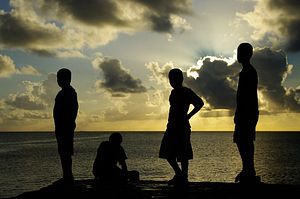New Zealand’s proposal for a new visa for “climate refugees” should be seen as an act of genuine political leadership. The announcement coincided with the start of this year’s international climate change negotiations. The proposal was also designed to signal to other regional governments that New Zealand was taking a pragmatic and humane approach to the issue of climate-linked migration.
While the politics of both migration and climate change have taken a reactionary turn across the world, New Zealand’s proposal stands out.
However, the issue of climate-linked migration is both vast and complex; it cannot be “fixed” with a new visa system, however bold the proposal is.
Looking at the language of the proposal, it seems that New Zealand’s climate change minister was proposing some kind of humanitarian visa. This is a very clever move. One of the issues that has hampered progress on this has been the impossibility of defining who counts as a “climate refugee.” When people move due to climate change impacts, the forces behind their decision to migrate are usually complex. Climate change is rarely the sole reason. Economic and political forces are usually also at play. This makes legally defining a “climate refugee” very difficult. But by creating a visa for anyone fleeing a humanitarian crisis — whether the crisis is caused by climate change or not — this problem is neatly side stepped.
However, New Zealand may already have the power to grant residency to people fleeing the impacts of climate change. In 2014 two highly publicized “climate refugee” court cases concluded in denying refugee status to the applicants. New Zealand’s immigration tribunal determined that fleeing the impacts of climate change was not grounds for refugee status. However, the court did grant the applicants’ permission to stay in New Zealand on humanitarian grounds. In other words the court decided: no, climate change is not grounds for refugee status. But, the humanitarian situation in Tuvalu is such that the court did not want to force the applicant to return.
The issue here is about political space. Climate-linked migration does not enjoy much time in the legislative bodies of most nations. The political will to do anything about it is weak in most developed country governments. When politicians do show leadership and use their political capital to achieve something, it must be something that is genuinely novel. Without the right thought and planning this political leadership could be wasted replicating solutions that already exist.
It is important not to see a new visa system as a panacea in fixing climate-linked migration and displacement. Most of the human movement caused by climate change is internal. People tend not to cross international borders. Disasters like droughts and hurricanes certainly cause millions of people to move but usually internally. For these people a visa isn’t much help. What is required is that their rights are respected by their own government, and that they are helped to resettle.
This means that the role of developed countries like New Zealand is not just about providing safe legal entry to people impacted by climate change (although that is important). Wealthy countries must also begin to assist poorer nations in dealing with the internal migration and displacement that new climate impacts will create. Aid and development budgets should become more focused on climate adaptation, but also on helping people migrate as a way of adapting.
Finally the language of “climate refugees” is not without criticism, especially in the Pacific. We have yet to see the final language of New Zealand’s proposal; however, labeling it a “climate refugee” visa is probably not helpful. For many people in Pacific the idea of becoming a “refugee” of any kind is unwelcome.
As the impacts of climate change unfold in the Pacific many communities are planning their own relocations and migrations. Their hope is that these happen in an organized and dignified way. To label these people as refugees doesn’t fit.
Alex Randall is a writer and researcher on climate, migration, and displacement. He is coordinator of the Climate and Migration Coalition.

































